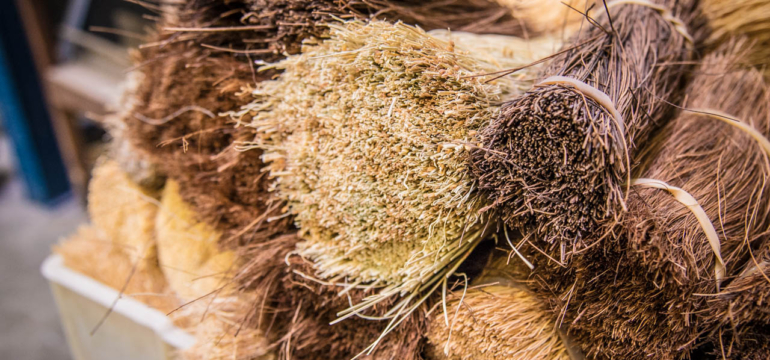How to Buy and Export Coconut and Other Vegetable Fibers from Kenya
How to Buy and Export Coconut and Other Vegetable Fibers from Kenya
Fibers are the raw materials used in the textile and garment industries. They are extracted from various vegetable materials like coconut husk, cotton, jute, hemp, etc.
These vegetable fibers are used to make clothes, carpets, and other textiles. Because of their natural properties, these vegetable materials have found applications in the clothing industry.
However, the production of these vegetable fibers has been limited due to the shortage of natural fibres.
The increase in demand for plant-based clothing has resulted in a rise in the production of these vegetable fibers.
This article highlights the importance of buying and exporting vegetable fibers from Kenya.
What are Coconut and Other Vegetable Fibers?
Vegetable and other fibres are materials used for textile, paper, and carpets manufacturing. These fibres are extracted from various plant materials like coconut, cotton, jute, hemp, etc.
These vegetable fibers are used to make clothes, carpets, and other textiles. Because of their natural properties, these vegetable materials have found applications in the clothing industry.
This is why these vegetable materials are also known as green or eco-friendly fibres.
Vegetable fibers are extracted from a seed, a fruit, a stem, a root, or a stem portion of a plant. Coconut products are used as the source of coconut fibre. Other vegetable fibers include bagasse, banana, banana stem, bamboo, cacao, cotton, hemp, kenaf, palm, pinyon pine, reed, sisal, soybean, sugarcane, tobacco, and vegetable oil seeds like soybean, sunflower, pumpkin, etc.
Why Buy and Export Vegetable Fibers?
Vegetable fibers are raw materials used in the textile and garment industries. They are extracted from various vegetable materials like coconut husk, cotton, jute, hemp, etc. These vegetable fibers are used to make clothes, carpets, and other textiles. Because of their natural properties, these vegetable materials have found applications in the clothing industry. This is why these vegetable materials are also known as green or eco-friendly fibres.
Vegetable fibers include bamboo, banana, bagasse, cacao, cotton, coconut, hemp, palm, pinyon pine, reed, soybean, sugarcane, tobacco, and vegetable oil seeds like soybean, sunflower, pumpkin, etc. These vegetable materials are extracted from various plant materials and used to make clothes, carpets, and other textiles.
When is the best time to buy and export vegetable fibers?
Vegetable fibers are extracted from a seed, a fruit, a stem, a root, or a stem portion of a plant. These materials are available throughout the year, but their demand often fluctuates. For instance, hand-woven cotton carpets are usually in season from April to August. On the other hand, hand-woven jute carpets are in season from October to December.
Generally, the best time to buy and export vegetable fibers is during the season when demand for these materials is high.
Steps to Buy and Export Vegetable Fibers
– Visit your local market and collect information on the vendors selling vegetable fibers from Kenya.
– Contact the vendors and negotiate a purchase price.
– Collect the payment.
– Make sure you have an export license.
– Make arrangements to export vegetable fibers from Kenya.
– Export vegetable fibers from Kenya.
– Import vegetable fibers into your country.
– Make arrangements to sell the vegetable fibers in your country.
Importance of Exporting
The world has been facing a crisis for its natural resources. The demand for these resources has increased over the years. This has led to an increase in the prices of these resources, making it unprofitable to extract them from their natural state.
Vegetable fibers are natural resources that are extracted from a seed, a fruit, a stem, a root, or a stem portion of a plant. These materials are available throughout the year, but their demand often fluctuates.
Vegetable fibers are used to make clothes, carpets, and other textiles. Because of their natural properties, these vegetable materials have found applications in the clothing industry.
The increase in demand for plant-based clothing has resulted in a rise in the production of these vegetable fibers. This has led to an increase in the demand for these vegetable fibers. However, the production of these vegetable fibers has been limited due to the shortage of natural fibres. The increase in demand for these vegetable fibers has resulted in a rise in the production of these vegetable fibers. This has led to an increase in the demand for these vegetable fibers.
Conclusion
Vegetable fibers are raw materials used in the textile and garment industries. They are extracted from various vegetable materials like coconut husk, cotton, jute, hemp, etc. These vegetable fibers are used to make clothes, carpets, and other textiles. Because of their natural properties, these vegetable materials have found applications in the clothing industry. This is why these vegetable materials are also known as green or eco-friendly fibres.
Vegetable fibers are extracted from a seed, a fruit, a stem, a root, or a stem portion of a plant. These materials are available throughout the year, but their demand often fluctuates. For instance, hand-woven cotton carpets are usually in season from April to August. On the other hand, hand-woven jute carpets are in season from October to December.
Generally, the best time to buy and export vegetable fibers is during the season when demand for these materials is high.
The best time to buy and export vegetable fibers is during the season when demand for these materials is high.
References
For more information about buying and exporting vegetable fibers from Kenya, read the following articles as well.
– Importing Vegetable Fibres from Kenya
– Exporting Vegetable Fibres from Kenya
– What Are the Best Exporters of Vegetable Fibers from Kenya?
– Final Word on Importing Vegetable Fibres from Kenya








LEAVE A COMMENT
You must be logged in to post a comment.